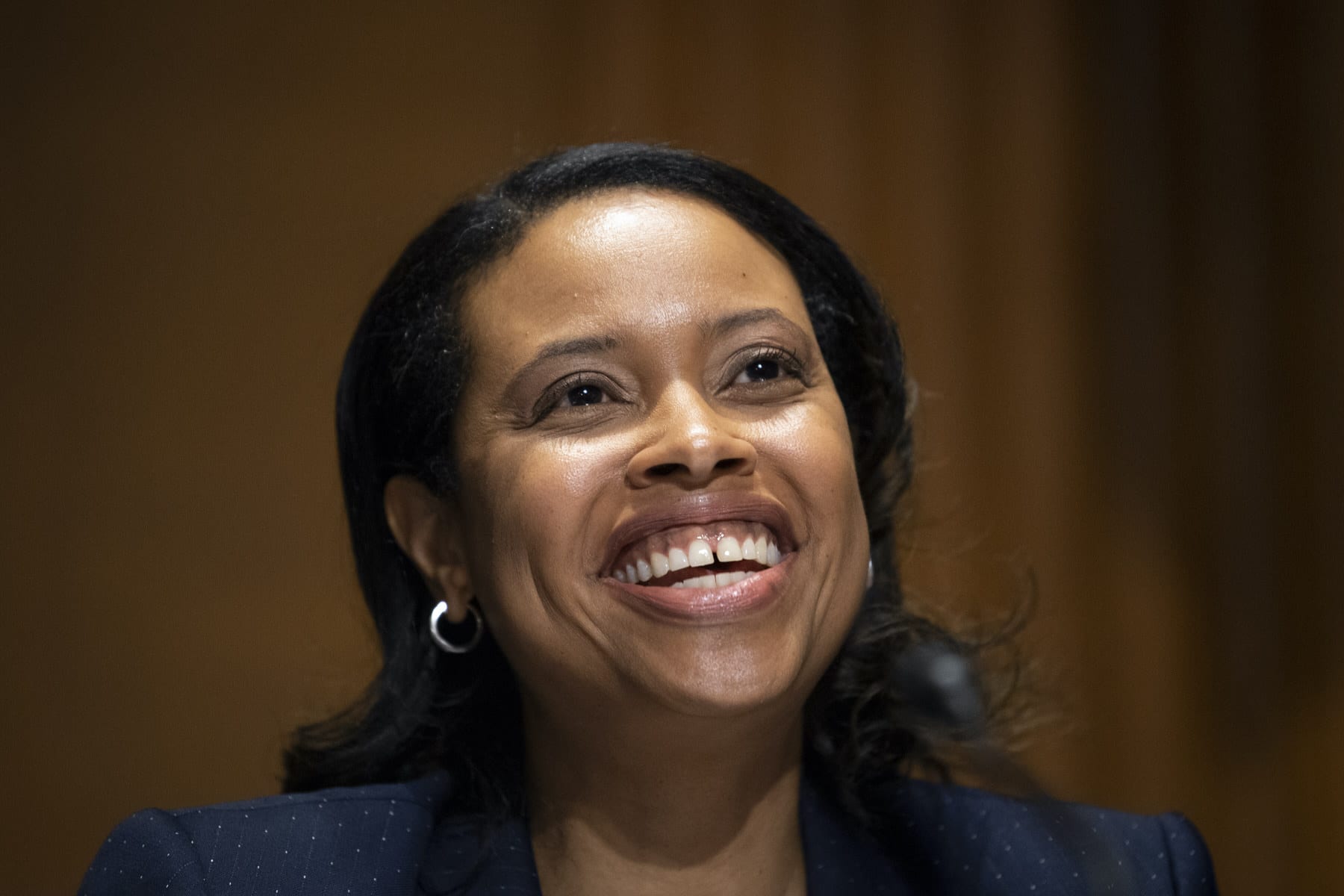President Joe Biden has quietly unveiled what is arguably the nation’s most significant health care expansion in more than a decade. In March, his American Rescue Plan Act made about 3 million more people eligible for government-subsidized insurance through the Affordable Care Act, and increased the size of those subsidies.
On the 2020 campaign trail, Biden vowed to build on the ACA to bring the nation closer to universal health care. But the Rescue Plan was only a first step — the ACA left more than 1 in 10 people without any health insurance. A fifth of Americans belong to the underinsured — they have coverage, but still pay large amounts out of pocket for medical care.
The future of the president’s agenda is unclear, especially with his signature jobs bill stalled in Congress.
But if Biden pursues any level of health reform, one person will likely be at the center: Chiquita Brooks-LaSure, his newly confirmed administrator for the Centers for Medicare and Medicaid Services (CMS) — the $1 trillion subsidiary of the Department of Health and Human Services — and the first Black woman to hold what is arguably Washington’s second-most powerful health job.
Reproductive health researchers believe her appointment could be pivotal in spearheading policies that address the nation’s crisis in pregnancy-related deaths.
Brooks-LaSure, who previously served in the Obama administration, has focused her research on policies to address racial inequities in pregnancy-related deaths, which disproportionately impact Black and Native American people. As a consultant, she has backed policies to extend eligibility for Medicaid — which covers low-income people and almost half of the nation’s births — so that people who qualify for the plan while pregnant can potentially keep that insurance for up to a year after giving birth. Biden’s first major legislation, the American Rescue Plan Act, created an optional vehicle for states to do just that.
And in the past four years, she has also worked with state governments to help develop “public option” or “Medicare buy-in” plans, which would give at least some Americans the option of buying a health insurance plan designed, supported and run by the government.
The details of those plans vary — who would be eligible to buy them, whether they would get tax breaks to help pay, and how much cheaper they would actually be than private insurance — but in theory, in theory, a well-run public option could lower the cost of private health insurance. That could particularly benefit women, who more often say they face cost barriers in accessing medical care.
In one of her first interviews as administrator, Brooks-LaSure spoke with The 19th about how she hopes to address racial and gender-based inequities through her tenure at CMS.
The conversation has been edited for length and clarity.
The 19th: What steps do you see CMS taking to address pregnancy-related deaths? And in particular, the disparate outcomes that we often see for Black people?
Brooks-LaSure: I think that CMS has a critical role in addressing health disparities. Payers — Medicare, Medicaid and marketplace coverage — are such a powerful tool for really driving behavior and changes.
And one of the things that we’ve seen in maternal health is that just as a woman who has given birth is in what is the most difficult period of time, three months after the birth of the baby, we often see changes in [insurance] status. I have the perspective of having been a mother, of being a mother, of really appreciating what it is like when you are just trying to figure out how to manage your child and your life. And then all of a sudden, you need to worry about your health insurance changing.
On Medicaid, the American Rescue Plan makes it even easier for states to provide postpartum coverage. This is such a critical piece to making sure that we address maternal mortality and morbidity. Because what we’ve seen is that it’s not just the birth of the child and delivery. What we see is that it’s a couple of months later where symptoms are missed.
I’m very excited that several states have taken steps to expand their Medicaid programs to cover postpartum care. This is one of the most critical proposals of policies that we can advance to make sure that we lower mortality and morbidity in our country.
Extending postpartum Medicaid eligibility is optional. I was just looking over the data, and we’ve seen some states take up the option, and some are putting more restrictions on who is eligible. From an equity standpoint, is that a concern? Is there more that CMS can or should do to encourage states to take up the option?
We may be able to do more things in conversations with states.
I think it’s also helping integrate what other programs exist on the ground — for example, it may be that women are eligible for other coverage like marketplace insurance — and making sure there’s a smooth handoff. So if someone is not eligible for Medicaid, that woman gets enrolled in the marketplace coverage as seamlessly and as easily as possible.
I think it’s multifold. Certainly, expansion of coverage is one critical piece.
Thinking about the pre-pregnancy period — we have seen so much evidence linking expanded Medicaid eligibility to improved pregnancy-related outcomes. But then we have the dozen states that have still declined to expand Medicaid, and don’t seem likely to take it up even with enhanced federal funding. Is there anything that you hope to do as administrator to otherwise expand access coverage?
Absolutely. I call it the unfinished work of the ACA. We’ve over the last 11 years seen how much the Affordable Care Act has changed people’s lives. When I was in the Obama administration, every time I gave a speech, I would be stopped afterwards by someone who said, “You changed my life.”
We changed society when we covered and expanded the Medicaid program and put the marketplaces in place. And the American Rescue Plan was the first time since the ACA that we expanded coverage, which is a wonderful gain.
Hopefully over the next few years, we will be able to work with Congress to make sure that those who were not part of that expansion as of yet get covered. We will strongly work to encourage states to take up that option if they choose to. But also to see whether there are federal actions that need to be taken, like — as the president outlined in the budget — talking about expanding the public option for the coverage gap. [Note: Though Biden endorsed a public health insurance option in his proposed budget, he did not request a specific funding amount to support it.]
You have done so much work around state public options. To what extent do you see that as a tool for health equity? And what might CMS do to work around these different kinds of public option proposals?
It’s critical that we cover people in the coverage gap. I think there are many ways to do it. And what is critical is that we make sure that we fill that gap.
I certainly think that the public option is one way to ensure equity in terms of no matter what state you live in, you have an option to enroll in coverage. My priority will be to work with Congress to cover the coverage gap in a way that ensures that it’s filled.
Are there other strategies that you have in mind that might address those coverage barriers, especially if Medicaid expansion remains politicized?
We’ll have to see what the Congress proposes. I work for the president, and the president has outlined the public option as a path forward.
What role do you see CMS playing, big picture, in addressing health equity? Are there specific disparities on lines of gender, race or both that you hope to address in your tenure?
What I hope to bring to CMS is that every policy we consider is looked at through the lens of health equity. So every decision we’re making, the question will be: As we advance this policy, what is going to be its impact on people who have been underserved? That includes racial disparities. It includes rural disparities. It also includes underserved areas that might be in cities and in more urban environments. But it needs to be the first question, not the last question.
That is what I hope to bring across all of the work we do. All of the payers — Medicare, as well — have a critical role to play. And we need to be asking ourselves these questions. We need to be collecting data so that we know what the results are.
In terms of specific areas, maternal health has been a real priority for me. Behavioral health is also one where CMS has an incredibly critical role — in addition to other parts of the department — to ensure equity. But I really see it as, it needs to be our orientation when we are considering prescription drug policy and Medicare solvency. Whatever the issue is, we need to make sure that we are thinking about equity as part of those conversations.






